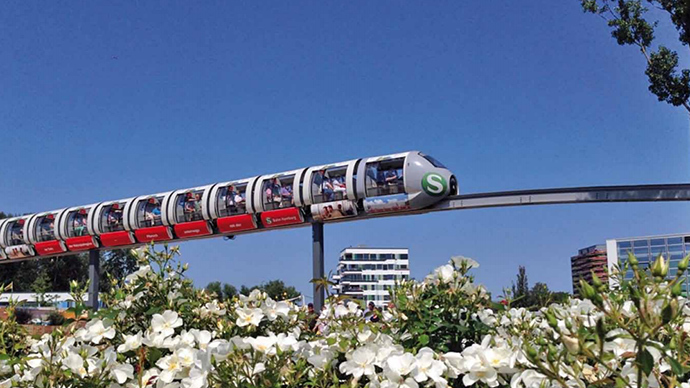What a waste! German watchdog slams weird ventures funded by taxpayers

A saltwater fish farm some 600 km from the sea, renovated thermal baths in the red and seven bridges over a 1.5 km long river – these are just some of the controversial German local government projects, costing millions to the taxpayers.
The annual “Schwarzbuch”, or the “Black Book”, was released by the Taxpayers' Alliance (BdSt), a German non-profit organization, on Tuesday. It focuses on ridiculously unprofitable businesses, financed by local governments from the taxpayers’ pockets.
Reiner Holznagel, president of the BdSt wrote in the introduction to this year’s report: “With our Black Book we make it clear, where, how and why it comes to prodigality. At the same time we work out constructive suggestions, so that it will no more come to prodigality in the first place!”
He added that this year the Book focused on over 13,000 municipal enterprises, some of them operating at a loss – and these are not theme parks or cinemas. German citizens may even have no idea that some of over 100 examples of such businesses are funded by tax money.
Cologne’s watchtowers are an illustration of such local ventures. The EU, Germany and North Rhine-Westphalia invested more than 240,000 euro ($306,500) in a series of platforms – which don’t exceed a few meters in height. One of them rises above the ground only at 80 cm. The question that has to be answered is what difference it makes for an observer of local fields and lands.
The community of Bad Neuenahr-Ahrweiler is the “lucky” owner of the Ahr Thermal Baths. This lossmaking leisure center and spa was sold to the municipality, a minor shareholder, by its managing company for 3 mln euro ($3,8 mln), plus a further 7.2 mln euro ($9,2 mln) on renovations – not having the money, the local administration had to fund it on credit. So, now local taxpayers have not only to service the loan, but also cover any losses of the business that has dismal prospects.

Another controversy originates from Düsseldorf. A 1.5 km long river, Kittelbach, already has six bridges over it – for the pleasure of local pedestrians and cyclists. However, the city’s authorities are planning to build the seventh bridge – costing an estimated 335,000 euro ($427,800).
A floating crane “Hiev” in the northern city of Kiel, located at the Baltic coast, was decommissioned after an overhaul that cost about 13 mln euro ($16.6 mln) and was financed by the Bundeswehr, the German armed forces.
“Around the world in eighty gardens”, said the motto of Hamburg’s International Garden Show, opened in 2013. A minuscule number of visitors led to the waste of 37 mln euro ($47.2 mln) for the organizer – the city’s Senate.
A town in Saarland, Völklingen, located not far from the French border – and over 600 km away from the North Sea – is proud to have its own marine fish farm. The company has been slammed for years, as it has no access to seawater, though it boasts fish production regardless of what season it is. Its owner is not a private investor, but a company that’s a 100% subsidiary of the town’s administration.
Those municipal enterprises have accumulated debts that are sometimes larger than those of local government budgets, Holznagel said, talking about a sum over 150 billion euros.

The “Black Book” also points to some inconsistencies in big-budget projects, such as ambitious renovation projects of Berlin State Opera (239 mln euro, $305 mln) and the Hamburg planetarium (7.4 mln euro, $9,45 mln).
German national debt is currently over 2.34 trillion euros.
With more than 60-year history, the BdSt campaigns for the reduction of public spending and debt. It believes that the risk from the “economic engagement of communes” lies heavy on the nation’s taxpayers.
“This maladministration must end,” demanded Holznagel at the presentation of the report that took place in Berlin, dpa news agency reported. “Politicians have to be more careful with our money and use the savings potential in a more serious way”.













